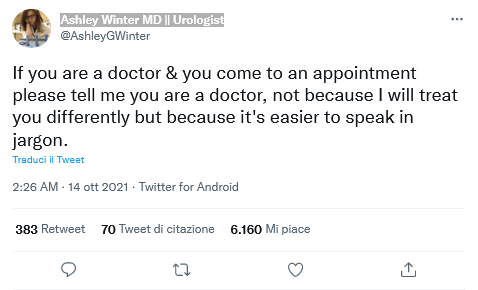Hello Doc! I am also a physician
When physicians present to a colleague as a patient, should they disclose their profession? Are there subjective preferences, or an ethical duty to do so?
When physicians need medical attention, should they say they are physicians?
Here’s an issue that sparked a lot of debate on Twitter a few weeks ago. When a physician introduces themselves to another physician as a patient, should they disclose their profession to their fellow colleague? Is this a subjective preference or is there a specific reason and an ethical duty to do so?
Article translated from the original Italian version
“If you are a doctor & you come to an appointment please tell me you are a doctor, not because I will treat you differently but because it's easier to speak in jargon.”
Dr. Ashley Winter
This is the tweet from Dr. Ashley Winter, a urologist in Portland, Oregon. She went on to add, "This doesn't mean I would be less patient-focused or less empathetic with a doctor or other healthcare provider. It just means that instead of saying 'you're going to have a catheter draining your urine into a bag,' I can say, 'you're going to have a Foley.'"
Her tweet resulted from an encounter with a patient who told Dr. Winter that he was a doctor only after she had spent time explaining a surgical procedure using simple, understandable language.
“I explained the surgery, obviously assuming he was an intelligent adult, but using entirely layman's terms,” Dr. Winter told Medscape Medical News. “I felt embarrassed. I wouldn't have treated him any differently, but I could have discussed the procedure with him in more professional terms. To some extent, it was my fault,” she commented, “I didn't take the time to ask about his work at the beginning of the visit.”
Dr. Winter's tweet prompted numerous responses. Several people chimed in on the thread to express their thoughts on the issue. “I took care of a retired cardiologist as a second-year resident and, honestly, he let me do all the explaining of his echo result. He never told me. I found out a couple days later and wanted to die,” posted @MaddyAndrewsMD.
Someone else recalled a similarly embarrassing experience when she continued to discuss headaches with a patient whose husband was in the corner smiling. “Later they told my assistant that her husband was a retired GP who had been practicing medicine longer than I had lived. I wanted to die,” posted @JSinghDO.
I am a colleague, but I am also your patient
Many physicians then commented as patients. Some wrote that they did not want to disclose their status because they felt it would negatively affect the care they received.
For example, @drhelenrainford commented, “In my experience my care is less ‘caring’ when they learn I'm a physician. They talk to me like they are discussing a patient with me – no empathy, just facts and even heavy results thoughtlessly thrown in my face. A terrible time as a patient… but that's a whole other story!”
@lozzlemcfozzle said, “I honestly prefer not to mention it. I've found that people skip over their explanations by assuming I ‘know’, or seem a little nervous when I tell them!”
Fear of coming across as pretentious
Others said they felt uncomfortable - pretentious, even - about revealing their qualifications, or worried that they might look like someone who expects special treatment.
User @MsBabyCatcher wrote, “I have a hard time doing this because I don't want people to think I'm pretentious or that I'm being the one who dictates the treatment.”@RedStethoscope responded to @MsBabyCatcher: “I thought so too until I had very poor care a few times, and was advised by other medical moms to play the doctor card. I have gotten better/more compassionate care by making sure it is clear that I am a doctor.”
It seems that many physicians find it “difficult” and “awkward” to self-identify when introducing themselves to colleagues. In an attempt to avoid this awkwardness, a few intentionally use specific medical language to open a conversation, rather than simply saying they are physicians.
Still others offered suggestions on how to approach the issue more directly when introducing themselves as patients, saying something like, “FYI, I'm a doctor, but I'm here because I really want your help and advice.”
Good communication and transparency
In an interview with Medscape Medical News, medical ethics expert Dr. Charlotte Blease stated, "I definitely think it's very reasonable to disclose that you're a physician to another physician. There is good reason to believe that this can make a difference in the quality of communication and transparency. When the ability to use medical terminology more freely improves patient understanding, autonomy, and shared decision making, then it can be a benefit. Since physicians should strive to communicate effectively with each patient and respect their unique needs and level of understanding, I see no reason to hide the fact that someone is a physician."
Source:
Ashley Winter. Profilo personale Twitter Ashley Winter MD || Urologist. 14 ottobre 2021 Worcester S. Should You Tell Your Doctor That You're a Doctor? Medscape Medical News. November 09, 2021
